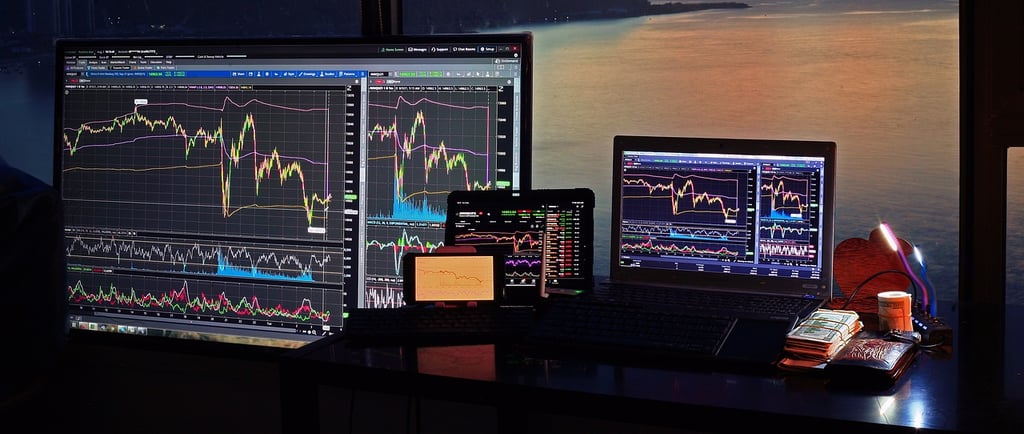5 Facts About the Stock Market You Didn't Know
Discover five fascinating facts about the stock market, from the origin of the first stock exchange to peculiar behaviors of investors. Learn about historical crashes, like the 1929 "Crash," and the early challenges faced by companies like Amazon and Apple. Understand how the market has evolved over time and what it reveals about human behavior and the global economy.
INFORMATION


1. The First Stock Exchange Didn't Trade Stocks
It may seem curious, but the first stock exchange in the world, the Amsterdam Stock Exchange, created in 1602, did not trade shares as we know them today. It was established to facilitate trading in securities of the Dutch East India Company, one of the first companies to issue shares to the public.
These shares allowed ordinary investors to share in the profits from commercial travel, particularly to Asia. This innovation gave rise to the concept of stocks and helped shape the modern financial market. The idea of collectively investing in companies soon spread to other countries, creating the foundation for the global stock market we know today.
2. The 1929 "Crash" Was More Dramatic than It Appears
The stock market crash of 1929, known as the "Great Depression," didn't happen overnight. Although the most famous day, called "Black Tuesday" (October 29, 1929), marked a drop of around 12% in the Dow Jones index, the market had been suffering a series of declines throughout that month.
The impact was devastating: In a matter of weeks, billions of dollars in wealth disappeared, businesses went bankrupt, and unemployment reached record levels. The event left crucial lessons about financial regulation and the need for diversification in investments.
A curiosity? Some investors, such as famous economist John Maynard Keynes, managed to profit during the crisis by betting on falling stock prices — a strategy now known as "short selling."
3. Famous Stocks Don't Always Start With Success
Today's valuable companies haven't always had glorious starts on the stock market. The classic example is Amazon, which began trading on the stock exchange in 1997 at just 18 dollars per share. In the early years, the company faced doubts about its ability to profit and saw its share price fluctuate widely.
Today, Amazon is one of the most valuable companies in the world, with its shares worth thousands of dollars. This transformation highlights the importance of looking at long-term growth potential, even amid initial uncertainty.
Another example is Apple, whose shares suffered severe declines in the 1990s when the company faced financial difficulties. Those who invested at the time and held on to the shares saw astronomical returns over the decades.
4. The Dow Jones Index Has Had Unusual Companies
The Dow Jones index, one of the best-known in the world, once included companies that today seem out of place in a modern market indicator. When it was created in 1896, the index was made up of 12 industrial companies, including tobacco, iron and gas factories.
An interesting fact is that General Electric was one of the original companies in the index and remained in it for more than a century, until it was removed in 2018. The index has modernized over the years, replacing industrial companies with technology giants, such as Apple, Microsoft and Salesforce.
This evolution reflects changes in the global economy and market behavior, with high-technology and services sectors assuming a dominant role.
5. There are “Superstitions” and Peculiar Behaviors in the Market
Despite being based on analysis and data, the stock market is full of superstitions and curious behaviors. A classic example is the so-called "January Effect", which suggests that stock prices generally rise in the first month of the year, driven by renewed optimism and the influx of new investment.
Another peculiarity is the collective behavior known as “herd behavior”. This occurs when investors follow buying or selling trends en masse, often without detailed analysis, contributing to bubbles and dramatic crashes in the market.
A famous case of herd behavior was the "Tulip Bubble" in the 17th century, considered the first major example of financial speculation. Although it did not involve stocks, the logic of the bubble is often compared to modern stock market crises.
The Stock Market Today: A Mystery and an Opportunity
The stock market continues to evolve, driven by technological advances, changes in the global economy and investor behavior. It is, at the same time, a space of opportunity and risk, where fascinating stories unfold every day.
For beginning investors, market trivia is more than just interesting facts; they offer valuable lessons about how the market works, how trends form, and how history can repeat itself.
The next big thing might be happening right now as you read this article. After all, the stock market never stops surprising and teaching.
Conclusion
These five curiosities show that the stock market is much more than numbers and graphs. It is a reflection of history, innovation and human behavior. For those who wish to explore this universe, it is essential to study the past and observe the present to make informed decisions and take advantage of the opportunities that the market offers, such as the famous cryptocurrencies. After all, who knows what the next big story will be?
